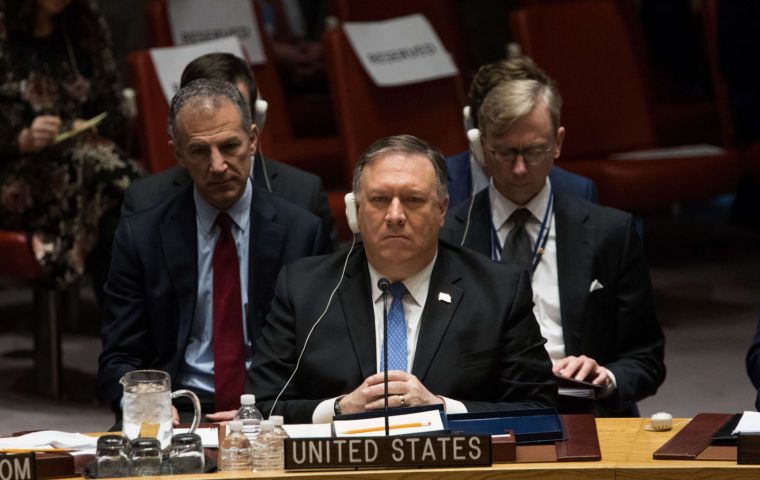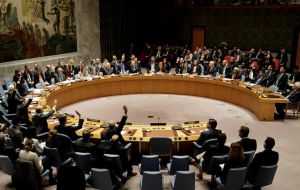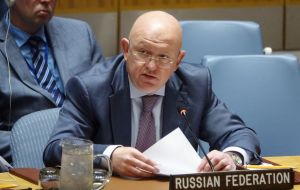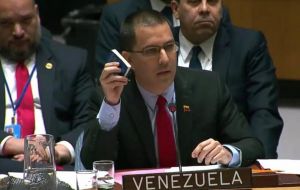MercoPress. South Atlantic News Agency
USA at the UN: Countries should support transition in Venezuela; Russia denounces interventionist acts
 Mike Pompeo asked the nations to paralyze financial transactions with the government of Nicolás Maduro
Mike Pompeo asked the nations to paralyze financial transactions with the government of Nicolás Maduro  The bloc that supports the transitional government of Guaidó with the US at the head faced the bloc led by Russia and China. Uruguay and Mexico, however, reiterated their request for a new dialogue
The bloc that supports the transitional government of Guaidó with the US at the head faced the bloc led by Russia and China. Uruguay and Mexico, however, reiterated their request for a new dialogue  Nebenzia, Russia, has responded by accusing Washington of “orchestrating a coup d'état”, making it clear that the US position is not shared by some members of the international community
Nebenzia, Russia, has responded by accusing Washington of “orchestrating a coup d'état”, making it clear that the US position is not shared by some members of the international community  Venezuelan Chancellor, Jorge Arreaza, rejected the European deadline for holding elections and charged again against the Spanish president, Pedro Sánchez.
Venezuelan Chancellor, Jorge Arreaza, rejected the European deadline for holding elections and charged again against the Spanish president, Pedro Sánchez. The Security Council convened by the United States this Saturday to discuss the institutional and political crisis that Venezuela is experiencing has been lifted this afternoon. With a strongly polarized participation, the bloc that supports the transitional government of Juan Guaidó with the US at the head, faced the block that recognizes as legitimate the regime of Nicolás Maduro, headed by Russia and China. Latin American countries also expressed their positions, describing the case as a crisis that directly affects the region.
The Secretary of State of the United States, Mike Pompeo, has accused Russia of supporting and protecting the “illegitimate Mafia State” of Nicolás Maduro, while calling for the recognition of Juan Guaidó, president of the Venezuelan parliament who was declared interim president of Venezuela last Wednesday, as the leader to move towards democracy.
The Russian representative at the UN, Vassily Nebenzia, has responded by accusing Washington of “orchestrating a coup d'état”, revealing that the US position is not shared by some members of the international community and that 11 countries of the region The Inter-American government was in favor of recognizing Maduro and not Guaidó, compared to 10 who recognize the president of the National Assembly of Venezuela as the legitimate president in charge.
The change of regime, reiterated the Russian ambassador, “is the preferred estrategy of United States.” Russia, as China, has veto power in the council and managed to block the adoption of a declaration of support for the National Assembly as the only democratically elected institution. However, they failed to block the session convened by the US.
The foreign minister of Venezuela, Jorge Arreaza, rejected the European deadline for holding elections and charged again against the Spanish president, Pedro Sánchez.
Arreaza clarified that Europe “will not give Venezuela deadlines” to call elections.
“Eight days of what?” Venezuelan Foreign Minister Jorge Arreaza asked, challenging the Spanish ultimatum. Venezuela denounced that these maneuvers are intended to stimulate the action of violent groups and force a foreign intervention in the country. “The US is at the head of the coup d'état,” said the foreign minister, seconded by his traditional allies: China, Russia and Cuba.
Sanchez said Saturday that if Nicolás Maduro does not call elections in Venezuela within eight days, Spain will recognize opposition leader Juan Guaidó as president.
It is estimated that this statement is a de facto recognition of Guaidó, but that short time is given to see if in that time a European consensus can be achieved and for the European Union as a whole, and not only Spain, who declare Guaidó as legitimate president.
Pompeo called on the rest of the nations to unite in the struggle for the freedom of Venezuela. In that sense, he asked the nations to paralyze financial transactions with the government of Nicolás Maduro. “We also hope that each of these countries will ensure that they disconnect their financial systems from the Maduro regime and that they allow the goods belonging to the Venezuelan people to go to the legitimate rulers of Venezuela,” he said.
The Secretary of State of the Donald Trump government has assured that the time has come for countries to “choose which side” they are on, whether with the “forces of freedom” or with “the league of Maduro and its chaos”. In this regard, he affirmed that “the US and its partners are the true friends of the Venezuelan people.” Russia, China, Syria, Iran and Cuba, he added, support a regime that violates the human rights of its own people. “No one supports democracy” or adopt broadly democratic systems, he warned, “and they use this microphone to condemn external interference.”
France has also denounced that the last elections were neither legitimate nor credible and has called for a new electoral convocation. If this call is not answered, he warned, measures will be taken to recognize Guaidó in his constitutional role. In response to Russia, his representative has made it clear that “it is not an internal issue” when the crisis has caused three million refugees. Germany, Belgium, Poland, the Dominican Republic and Peru have all expressed themselves in the same terms.
Countries of the region affected by the effect of the Venezuelan crisis, in their capacity as receivers of Venezuelan migrants and refugees, intervened in the Security Council. Chile, as Colombia, called for the recognition of Guaidó, in line with Secretary Pompeo, rejecting “proposals for false dialogues” in Venezuela.
Uruguay and Mexico, however, reiterated their request for a new negotiation process in Venezuela.
The Uruguayan delegate mentioned the statement issued this week by the Ministry of Foreign Affairs.
The Uruguayan delegate mentioned the statement issued this week by the Foreign Ministry of his country, which calls for a dialogue in which all actors must seek a peaceful and democratic option, with a credible inclusion process.




Top Comments
Disclaimer & comment rulesCommenting for this story is now closed.
If you have a Facebook account, become a fan and comment on our Facebook Page!